|
|
|
Sort Order |
|
|
|
Items / Page
|
|
|
|
|
|
|
| Srl | Item |
| 1 |
ID:
178881
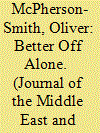

|
|
|
|
|
| Summary/Abstract |
Somalia is a country of two realities: the internationally recognized Federal Republic of Somalia and the self-declared Republic of Somaliland. While the Federal Republic endures chronic instability and unrest, Somaliland has established security, economic growth, and a functioning government. This article argues that a significant contributing factor to this divergence is the radically different colonial regimes that ruled the two regions before their unification and independence in 1960. British rule in British Somaliland sought primarily to deny other empires control of the Protectorate and to trade livestock with the indigenous communities. Italy, however, engaged in a protracted and violent effort to establish a plantation colony in Italian Somaliland. Drawing from colonial-era sources and with a focus on the earliest years of imperial and Somali engagement, this article situates the long-run divergent trajectories of British Somaliland and Italian Somaliland within the broader literature on colonial institutions and long-run economic development.
|
|
|
|
|
|
|
|
|
|
|
|
|
|
|
|
| 2 |
ID:
098506
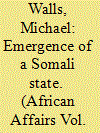

|
|
|
|
|
| Publication |
2010.
|
| Summary/Abstract |
At a time when Somalia is widely viewed as a political and humanitarian disaster, it is significant that the north-western territory of Somaliland has installed a comparatively stable government and held a series of elections that have been declared 'relatively free and fair' by observers. This article considers a key period in the establishment of the current system of state, from the 1991 collapse of the Siyaad Barre regime to the 1993 conference in the northern town of Borama which saw the transition from an interim military government to civilian administration. While the Borama conference did not end conflict in Somaliland, it resulted in an interim constitution that eventually enabled a more lasting peace, along with popular elections for local government, President, and Lower House of Parliament. The article argues that the success of the 1991-3 process was built on a set of deeply embedded social norms that emphasized the importance of dialogue between antagonists; a willingness to accept that the most complex grievances would be set aside indefinitely to avoid the contentious process of negotiating compensation payments; the opening of space for the intervention of mediators; and a sustained commitment to consensus building in preference to divisive voting. In short, local resources have been employed effectively in the cause of achieving a lasting peace and what appears to be a viable system of democracy.
|
|
|
|
|
|
|
|
|
|
|
|
|
|
|
|
| 3 |
ID:
185916
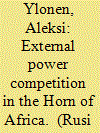

|
|
|
|
|
| Summary/Abstract |
External power competition in the Horn of Africa is intensifying. In recent years, the US and China, as well as regionally powerful states such as Saudi Arabia, Turkey, the UAE and Qatar, have all deepened their involvement in the sub-region. This has opened new opportunities for state and non-state actors in the Horn to gain influence through financial and material resources by associating themselves with external powers. Somaliland is one such actor. In the current scenario, Hargeisa’s increasingly sophisticated foreign policy has enabled it to step up its quest for international recognition and development. In this article, Aleksi Ylönen discusses the increasing contestation of influence among external powers in the Horn of Africa and Somaliland’s position in this changing regional context.
|
|
|
|
|
|
|
|
|
|
|
|
|
|
|
|
| 4 |
ID:
188859
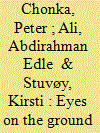

|
|
|
|
|
| Summary/Abstract |
This article reflects on the use of narrative interviews alongside participatory and remote-access visual methods to produce knowledge on and in conflict-affected settings. It details our iterative and reactive experiences of navigating transnational academic, policy and humanitarian networks to attempt to undertake ethical research on the security experiences of displaced people in Somali cities and facilitate their engagement with policymakers. We explore tensions in the combined use of increasingly accessible digital tools (camera-equipped smartphones and open-access satellite imagery) in facilitating a participatory, narrative-based approach to security research while also mitigating access limitations to research sites. We argue that a holistic and reflexive approach to everyday security within a technologically mediated data-collection process – for both researchers and research participants – not only is important for negotiations around ethical fieldwork, but also can be generative of findings about the research site itself. Methods are not brought into a context and deployed by researchers in ways that are fully under their control. In the case explored here, how the researchers and research participants engaged in dialogue about various methods, reflected their connections within networks of knowledge production dominated by humanitarian donors/partners, while also highlighting important aspects of displaced people’s everyday experiences of (in)security and marginalization in Somali cities.
|
|
|
|
|
|
|
|
|
|
|
|
|
|
|
|
| 5 |
ID:
171931
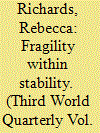

|
|
|
|
|
| Summary/Abstract |
Even in the context of a relatively flourishing state, fragility can be an enduring feature of a political system, particularly in the case of recently established or unrecognised states. This article examines the nature of state-building in a specific context to question the assumption that forms of hybrid governance or pre-existing forms of governance are a necessary evil to be tolerated but which needs ultimately to be overcome during state-building. It does this by adopting the language of resilience and focusing on the case of Somaliland to highlight the role of clan governance as a mechanism of political resilience and as a means of promoting the flexibility required for state-building. Yet, at the same time, the process of state-building often involves formalising governance and limiting the role of traditional social-political forms of governance such as clans, ignoring their role in legitimating and stabilising the political system. However, as this article argues, stability and fragility are inextricably linked; while the clan system has been an important force in stabilising the state, it has also become a pressure point for the state’s latent fragility. By contextualising fragility and stability within the language of resilience, though, this symbiotic relationship can be better analysed.
|
|
|
|
|
|
|
|
|
|
|
|
|
|
|
|
| 6 |
ID:
087860
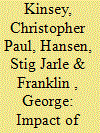

|
|
|
|
|
| Publication |
2009.
|
| Summary/Abstract |
The article discusses the use of private security contractors to support coastguard forces in the Somali substate entities of Puntland and Somaliland. Neither of these entities is sufficiently robust to raise and maintain an effective maritime security force without external assistance, hence they have had recourse to the private sector for training, logistical and operational support and high-level consultancy with respect to their coastguards. The article makes some general observations about the international private security industry and Somali politics in order to provide a context for the three case studies. The case studies, each of which covers the engagement of one security contractor in support of a coastguard, assess the roles played by the contractors, making particular reference to sustainability and influence on governance networks. The analysis establishes a matrix of security company typologies and potential roles and then uses this matrix to suggest which types of company might be best employed for which functions. The article has current pertinence, as two of the three case studies concern efforts by substate entities to hire private security to enhance anti-piracy capability.
|
|
|
|
|
|
|
|
|
|
|
|
|
|
|
|
| 7 |
ID:
132201
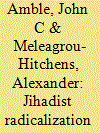

|
|
|
|
|
| Publication |
2014.
|
| Summary/Abstract |
Al-Shabaab, the Somali militia currently fighting against African forces in Somalia, has seen varying degrees of success in its regional recruitment efforts. As it continues to struggle against the forces of the African Union Mission in Somalia (AMISOM), the militia has tried to step up these efforts. To this end, the group has seen significant success in countries such as Kenya, while it has struggled in Somaliland. The strategies and tactics employed by al-Shabaab in order to successfully recruit vary depending on geographical location, as do the motivations to join, and drawing on fieldwork in both Kenya and Somaliland this study will compare and contrast the effectiveness al-Shabaab recruitment in both of these countries. In doing so, it will examine which local conditions either enhance or limit these efforts, identifying some of the determinants of the success and failure of jihadist recruitment in east Africa.
|
|
|
|
|
|
|
|
|
|
|
|
|
|
|
|
| 8 |
ID:
148454
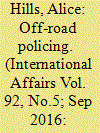

|
|
|
|
|
| Summary/Abstract |
Prompted by the trend to see information and communications technology (ICT) as a tool for capacity building, this article asks whether the use of ICT has—or can—recast centre–periphery relations in a hybrid country such as Somaliland. Taking as its departure point Herbst's observation that a fundamental problem confronting African leaders concerns how to extend or consolidate authority over sparsely settled lands, it uses recent developments in Somaliland's coast guard and immigration police to assess ICT's contribution to changing security provision in remote and coastal areas. This allows for an analysis of Somaliland's law enforcement framework, the relationship between its politics and practice, the practical application of its coercive resources, and the Silanyo government's priorities and preference for consensus and co-existence whenever security imperatives allow. It suggests that ICT can be a desirable operational tool or a variable in existing power networks, but that it does not represent a new mode of security governance. ICT's potential to connect Somaliland's government and populace, and politics and practice, is for now minimal, but identifying the ways in which security actors such as coast guards actually use ICT allows for a more accurate assessment of the variables shaping centre–periphery relations. Contrary to Herbst's observation, the Silanyo government does not need to overtly or systematically extend, consolidate or exert its authority in remote and coastal areas. Spatial metaphors such as centre–periphery help to clarify the situation, but the significance invested in them reflects western rationalities, rather than Somali realities.
|
|
|
|
|
|
|
|
|
|
|
|
|
|
|
|
| 9 |
ID:
141140


|
|
|
|
|
| Summary/Abstract |
For unrecognised states in the international system recognition of sovereign statehood is the ultimate goal. Not being ‘a state’ means being excluded from global networks. However, even in the most basic definitions and criteria for unrecognised states there is a period of relative autonomy accorded due to non-recognition. This is a period when political actors can use isolation to establish the state’s narrative, identity and structure. It is this period that provides the foundations for external interaction. It is in this period that the state is born. This article examines another side to the politics of recognition: the politics of non-recognition. Drawing on the contemporary examples of Somaliland and Kurdistan, the article assesses the benefits as well as the costs of non-recognition.
|
|
|
|
|
|
|
|
|
|
|
|
|
|
|
|
| 10 |
ID:
145289
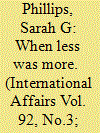

|
|
|
|
|
| Summary/Abstract |
The internationally unrecognized ‘Republic of Somaliland’ presents a case in which the domestic drivers of peace and development may be examined when aid and other forms of international intervention are not significant variables. The relative autonomy of its peace process offers an alternative perspective on post-conflict transitions to that offered in the majority of the literature, which instead problematizes either the perverse outcomes or unintended consequences of international interventions in conflict-affected areas. The purpose of this article is not to establish the salience of Somaliland's relative isolation in its ability to achieve peace and relative political order, as this is already documented in the literature. Rather, it explores the ways in which that isolation fostered mutual dependence between powerful political and economic actors for their survival and prosperity. It uses a political settlements framework to probe the implications of this dependence for western statebuilding interventions in post-conflict situations. The findings present a challenge to orthodox assumptions about how states transition out of conflict, particularly that: greater vertical inclusivity necessarily strengthens a political settlement; effective Weberian institutions are a prerequisite of an enduring peace; and that external assistance is usually necessary to end large-scale violence in developing states or to prevent a recurrence of the conflict.
|
|
|
|
|
|
|
|
|
|
|
|
|
|
|
|
|
|
|
|
|